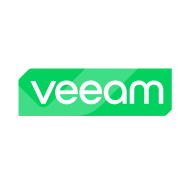


Find out what your peers are saying about Dell Technologies, Hewlett Packard Enterprise, NetApp and others in Deduplication Software.
If we request the price for StoreOnce as a standalone product, it tends to be higher than when it is included in a larger solution where we can receive better discounts.
If you have the configuration well maintained and configured, you should have good efficiency and compression for the clients and for yourself.
HPE's support is very good, proactive, and monitored through InfoSight.
When we open a case for support during installation or other matters, they are always timely and provide full support.
Sometimes, the support was inadequate because the initial architecture was poorly defined.
We are also using it ourselves for the SAN and CIFS protocol.
They often provide basic solutions, such as suggesting a failover or a power cycle, which are not the sophisticated solutions we expect from a vendor.
Most cases are handled perfectly.
I would rate their technical support a 10 out of 10.
The escalation from first, second to third tier is sometimes very long-lasting, but the resolve rate is quite high.
The ability of HPE StoreOnce to scale is strong when more sizing options are available.
The scalability of HPE StoreOnce is very good.
NetApp FAS Series is scalable, and it is possible, but you need to pay.
The NetApp FAS Series is scalable and offers numerous solutions, but only if customers are willing to invest in the shelves.
It involves acquiring additional licenses as needed.
In order to scale Veeam Data Platform, we have to pay a lot more money.
For the stability of HPE StoreOnce, based on customer feedback, I rate it highly as one of the most stable products in the backup and archiving line.
When panic occurs on the node, it reboots itself, and we have experienced numerous hardware-related issues.
There are no issues with stability in Veeam Data Platform.
It is well-positioned on the radar, with a mature and stable solution.
The benefits of StoreOnce, which we discussed, include its compression capabilities with a ratio of 1 to 10.
While the solution does everything expected, it would be beneficial if AI could be integrated for optimization and monitoring.
Nutanix leads the business in this approach, and I feel that NetApp is missing some aspects, such as CPU, GPU, and RAM, in its AI portfolio.
There is an opportunity there for NetApp with Cloud Volumes ONTAP.
It was not possible to have a custom user inside ONTAP without the delete permission to delete the volume.
The improvement we would like to see is the option to scale Veeam Data up in smaller sections rather than large sections, which requires paying much more.
Reducing it by 20% would make it more accessible to a broader range of customers.
OpenStack is something Veeam Data Platform doesn't support, and they haven't indicated that they will support it in the future.
The solution is quite expensive, possibly rated around seven and a half on a scale of one to ten.
The pricing of NetApp FAS Series is not cheap, but in comparison to other vendors, NetApp FAS Series is affordable.
I don't consider the price expensive given its importance.
A reduction of 20% in the current cost would make the solution more attractive to clients.
Veeam Data Platform is more expensive than OpenStack because we pay for it in US dollars, while we pay for OpenStack in Egyptian pounds.
If the actual size for backup data is 100 terabytes, using StoreOnce, it will be around less than 10% of the original size due to the 1 to 10 deduplication ratio.
The most effective features for data deduplication are maximizing storage capacity and minimizing expenditure.
The recovery is important.
While NVMe disks are expensive and require three disks for parity calculations, hard drives in NetApp FAS Series are inexpensive, making it more cost-efficient per GB, even with RAID tech implementation.
One important feature for customers is its ease of use and continuity, enabling seamless usage across on-premise and cloud environments.
At this moment, autonomous ransomware protection is the key feature.
The platform is user-friendly, comprehensive, and compatible with numerous market solutions, including virtualization and bare metal servers.
The most important aspect of this platform is data security with immutable data in the storage.
Veeam Data Platform is valuable for its stability and the ability to easily contact support for assistance.
| Product | Market Share (%) |
|---|---|
| HPE StoreOnce | 18.6% |
| Dell PowerProtect DD (Data Domain) | 27.4% |
| Dell PowerProtect Data Manager | 14.0% |
| Other | 40.0% |
| Product | Market Share (%) |
|---|---|
| NetApp FAS Series | 3.7% |
| Dell PowerProtect DD (Data Domain) | 27.4% |
| HPE StoreOnce | 18.6% |
| Other | 50.3% |
| Product | Market Share (%) |
|---|---|
| Veeam Data Platform | 11.9% |
| Commvault Cloud | 6.1% |
| Rubrik | 6.0% |
| Other | 76.0% |



| Company Size | Count |
|---|---|
| Small Business | 38 |
| Midsize Enterprise | 31 |
| Large Enterprise | 49 |
| Company Size | Count |
|---|---|
| Small Business | 30 |
| Midsize Enterprise | 37 |
| Large Enterprise | 57 |
| Company Size | Count |
|---|---|
| Small Business | 216 |
| Midsize Enterprise | 99 |
| Large Enterprise | 138 |
HP StoreOnce Backup is a data backup solution that provides a consistent, high-performance, scale-out architecture for your entire enterprise. Reduce the amount of backup data capacity by 95 percent, and choose between powerful dedicated appliances for data centers, or flexible virtual appliances for smaller and remote offices.
NetApp FAS series is an enterprise-level storage system that provides a wide variety of data management services, including data protection, block and file storage, and data management.
NetApp FAS is designed to be highly scalable, allowing your organization to grow storage capacity on demand. NetApp FAS also supports multiple protocols, including NFS, SMB, iSCSI, and Fibre Channel, as well as various storage architectures, including SAN (Storage Area Network) and NAS (Network-Attached Storage).
The FAS series has multiple data protection and data management features, including snapshots, cloning, replication, and deduplication, to help secure your data and manage it more efficiently. The system integrates with other NetApp products and solutions, to create a unified data management platform. The system can be deployed on-premise, on multi-cloud environments, or hybrid.
NetApp FAS Series Benefits and Features
NetApp FAS series provides its users with several key benefits and features, including:
Reviews from Real Users
NetApp FAS Series stands out among its competitors for a number of reasons. Several major ones are its speed, reliability, and a wide variety of features.
Adriano S., IT project and infrastructure service manager, writes, “The replication feature is noteworthy because it's faster than most and it uses little bandwidth. Then there's the friendly interface that the equipment offers. With this interface, it is very easy to manage.”
Temitope O., a NetApp product manager at Hiperdist Ltd, says, “I like the unified management feature because sometimes you end up running a single protocol on the entire system. You rather have a system for a particular protocol and another system for other protocols, especially in a big environment like mine.”
Veeam Data Platform is designed for modern data management, providing secure backups, intelligent data insights, and resilience. It ensures data is protected, recoverable, and manageable across complex environments, supporting business continuity effectively.
Veeam Data Platform stands out with its robust capabilities in data protection, orchestrated recovery, and efficient management. It offers a simple interface while ensuring data security and availability, which is critical for businesses. The platform's compatibility with virtual machines, databases, and applications across VMware, Hyper-V, and cloud environments makes it a versatile choice for backup and disaster recovery strategies. Users gain confidence from its performance, from secure backups to facilitating effective infrastructure monitoring.
What are the key features of Veeam Data Platform?Veeam Data Platform is widely implemented by industries needing robust disaster recovery plans and data management solutions. It is particularly valuable in environments utilizing hybrid cloud solutions, protecting mission-critical workloads, and ensuring business continuity. Businesses leverage its capabilities to safeguard data integrity and facilitate long-term retention through efficient infrastructure management.